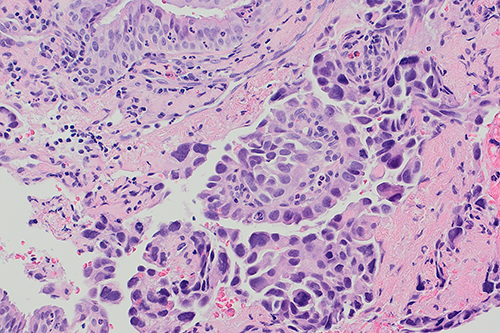The largest review of papers for brain cancer that has spread from the lungs has found abnormalities in the brain cancer and for which licensed drugs could be clinically trialled to find out if they could treat the disease. The research led by the University of Bristol and published in Neuro-Oncology Advances also found genetic differences between smokers and non-smokers.
Around 25,000 patients in the UK suffer from cancer that has spread to the brain -known as metastases – most commonly from lung and breast cancer, and causes death in the majority of these patients.
The genetic mutations in primary lung cancers have been widely studied, but less is known about the changes in the cancer once it has spread to the brain. The research team wanted to find out the genetic changes in brain metastasis from non-small cell lung cancer (NSCLC) and whether there are drugs already available that could potentially be offered to these patients.
The researchers carried out a review from 72 papers of genetic mutations in brain metastasis of NSCLC from 2,346 patients’ data on patient demographics, smoking status, genomic data, matched primary NSCLC, and PD-L1, which is a protein found on cancer cells.
The study found the most commonly mutated genes were EGFR, TP53, KRAS, CDKN2A, and STK11. Common missense mutations —mutations that lead to a single amino acid change in the protein coded by the gene— included EGFR L858R and KRAS G12C
In certain cases the genetic mutations were different in the brain metastasis from the primary lung cancer. There were also differences in the genetic mutations in smokers versus patients who had never smoked. Brain metastases of smokers versus non-smokers had different missense mutations in TP53 and EGFR, except for L858R and T790M in EGFR, which were seen in both subgroups.
The research team found from the top ten commonly mutated genes which had primary NSCLC data, 37% of the specific mutations assessed were different between primary NSCLC and brain metastases. The researchers suggest Medicines and Healthcare products Regulatory Agency-approved drugs already licensed could potentially be tested to treat the disease in clinical trials.
The genetic landscape of the different subtypes of NSCLC is well known. TP53 and LRP1B mutations are common to all NSCLC subtypes, but certain subtypes also have specific alterations. Lung adenocarcinoma is the most common type of lung cancer and has higher frequencies of KRAS, EGFR, KEAP1, STK11, MET, and BRAF somatic mutations – changes that have accumulated in the cancer genome.
Some studies suggested the genomic landscape of NSCLC in smoker’s vs non-smokers differ independent of subtype. One study found EGFR mutations, ROS1 and ALK fusions to be more prevalent in non-smokers, whereas KRAS, TP53, BRAF, JAK2, JAK3 and mismatch repair gene mutations were more commonly mutated in smokers.
Kathreena Kurian, Professor of Neuropathology and Honorary Consultant at North Bristol NHS Trust, Head of the Brain Tumour Research Centre at the University of Bristol and co-author of the paper, said: “Our research recommends that all patients should have their brain metastasis examined for mutations in addition to their primary lung cancer because they may be different.
“This evidence could form the backbone for new clinical trials for patients with brain metastasis in non-small cell lung cancer using drugs that are already available.”
The research was funded by Cancer Research UK; Southmead Hospital Charity: Brain Tumour Bank Research (fund 8036); Innovate UK; and the National Institute for Health and Care Research (NIHR).
The team suggest the next steps for the research would be to consider whole genome sequencing on brain metastasis to look for other types of mutations, such as, common insertions/deletions for which drugs are already available.
The views expressed in this article are those of the authors and not necessarily those of the NIHR, or the Department of Health and Social Care.
Paper
‘Genomic landscape and actionable mutations of brain metastases derived from non-small cell lung cancer: a systematic review’ by Lily J Andrews, Kathreena M Kurian et al. in Neuro-Oncology Advances [open access]
Further information
Lung cancer causes more deaths worldwide (18.4%) than any other cancers, leading to around 1.8 million deaths per year [CA paper]. Non-small cell lung cancer (NSCLC) represents around 80-90% of lung cancers, and for patients with advanced cancer that cannot be treated with surgery, around 27% of patients will develop brain metastases (BM).
About the National Institute for Health and Care Research (NIHR)
The mission of the National Institute for Health and Care Research (NIHR) is to improve the health and wealth of the nation through research. We do this by:
Funding high quality, timely research that benefits the NHS, public health and social care;
Investing in world-class expertise, facilities and a skilled delivery workforce to translate discoveries into improved treatments and services;
Partnering with patients, service users, carers and communities, improving the relevance, quality and impact of our research;
Attracting, training and supporting the best researchers to tackle complex health and social care challenges;
Collaborating with other public funders, charities and industry to help shape a cohesive and globally competitive research system;
Funding applied global health research and training to meet the needs of the poorest people in low and middle income countries.
NIHR is funded by the Department of Health and Social Care. Its work in low and middle income countries is principally funded through UK Aid from the UK government.
The NIHR is a major funder of global health research and training.
About North Bristol NHS Trust (NBT)
North Bristol NHS Trust (NBT) runs healthcare services from Southmead Hospital, Cossham Hospital, Bristol Centre for Enablement as well as satellite sites across Bristol, North Somerset and South Gloucestershire.
As well as providing high-quality healthcare to the local population, NBT is a centre of excellence in the South West and beyond in a range of services and major specialities including neurosciences, orthopaedics and plastic surgery.
NBT also run the Severn Major Trauma Network caring for the most seriously injured patients from injury to rehabilitation. The Network covers the Severn region and includes 2.3 million adults over 800,000 children.
NBT remains a leader in health research that aims to answer important clinical questions. We are currently managing £30 million grants awarded to deliver new programmes of research.
Our pioneering treatments and advances in care have won international recognition, placing us at the forefront of medical knowledge.
About Southmead Hospital Charity
Southmead Hospital Charity funds ground-breaking medical research; provides specialist equipment at the cutting-edge of technology and improves treatment facilities for generations to come. It raises money to support the work of North Bristol NHS Trust at Southmead Hospital, Cossham Hospital and community health services in the Bristol, South Gloucestershire and North Somerset areas.
About Cancer Research UK
Cancer Research UK is the world’s leading cancer charity dedicated to saving lives through research, influence and information.
Cancer Research UK’s pioneering work into the prevention, diagnosis and treatment of cancer has helped save millions of lives.
Cancer Research UK has been at the heart of the progress that has already seen survival in the UK double in the last 40 years.
Today, 2 in 4 people survive their cancer for at least 10 years. Cancer Research UK wants to accelerate progress and see 3 in 4 people surviving their cancer by 2034.
Cancer Research UK supports research into the prevention and treatment of cancer through the work of over 4,000 scientists, doctors and nurses.
Together with its partners and supporters, Cancer Research UK is working towards a world where people can live longer, better lives, free from the fear of cancer.

